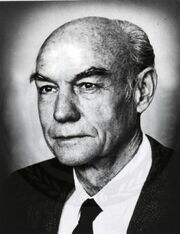
Roger Wolcott Sperry
Roger Wolcott Sperry (August 20, 1913 - April 17, 1994) was a neuropsychologist and Nobel laureate who, together with David Hunter Hubel and Torsten Nils Wiesel, won the 1981 Nobel Prize in Medicine for his work with split-brain research.
Sperry was born in West Hartford, Connecticut to Francis Bushnell and Florence Kraemer Sperry. Roger had one brother, Russell Loomis.Their father died when Roger was 11. Sperry attended Oberlin College where he received his bachelor's degree in English in 1935 and a master's degree in psychology in 1937. He received his Ph.D. from the University of Chicago in 1941. Sperry then did post-doctoral research with Karl Lashley at Harvard University.
In 1942, he began work at the Yerkes Laboratories of Primate Biology, then a part of Harvard University. He left in 1946 to become an assistant professor, and later associate professor, at the University of Chicago. In 1952, he became the Section Chief of Neurological Diseases and Blindness at the National Institutes of Health. In 1954, he accepted a position as a professor at the California Institute of Technology (Caltech) where he performed his most famous experiments.
Before Sperry's experiments, some research evidence seemed to indicate that areas of the brain were largely undifferentiated and interchangeable. In his early experiments Sperry challenged this view by showing that after early development circuts of the brain are largely hardwired.
In his Nobel-winning work, Sperry separated the corpus callosum, the area of the brain used to transfer signals between the right and left hemispheres, to treat epileptics. Sperry and his colleagues then tested these patients with tasks that were known to be dependent on specific hemispheres of the brain and demonstrated that the two halves of the brain may each contain consciousness. In his words, each hemisphere is...
"indeed a conscious system in its own right, perceiving, thinking, remembering, reasoning, willing, and emoting, all at a characteristically human level, and . . . both the left and the right hemisphere may be conscious simultaneously in different, even in mutually conflicting, mental experiences that run along in parallel."(1)
This research contributed greatly to understanding the lateralization of brain function. In 1989, Sperry also received National Medal of Science.
In 1949, Sperry married Norma Gay Deupree. They had one son, Glenn Michael, and one daughter, Janet Hope.
See also[]
Publications[]
Books[]
Book Chapters[]
Papers[]
- Sperry, R.W. (1961) Cerebral organisation and behaviour, Science 133: 1749-57,
- Sperry, R. (1968) Hemispheric deconnection and unity in conscious awareness. American Psychologist, 23. 723-33.
- Sperry. R. (1969) A modified concept of consciousness. Psychological Review, 76, 532-6.
- Sperry. R. (1993) The impact and promise of the cognitive revolution, American Psychologist, 48, 878-85.
- Sperry. R. (1995) The riddle of consciousness and the changing scientific worldview, Journal of Humanistic Psychology, 35. 7-3 3.
External links[]
de:Roger Sperry
es:Roger W. Sperry
fr:Roger Wolcott Sperry
nl:Roger Sperry
pt:Roger Wolcott Sperry
sk:Roger Wolcott Sperry
fi:Roger Wolcott Sperry
sv:Roger W. Sperry
| This page uses Creative Commons Licensed content from Wikipedia (view authors). |